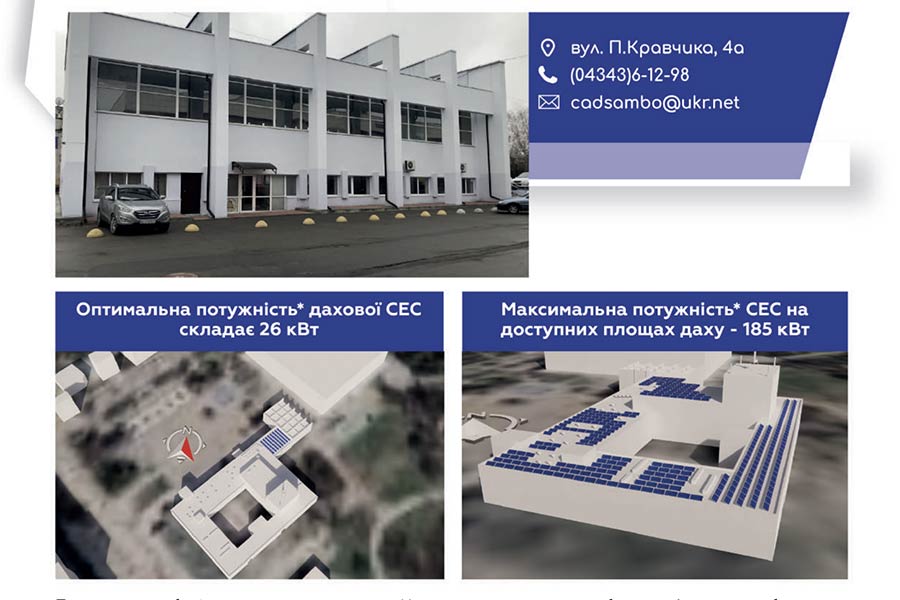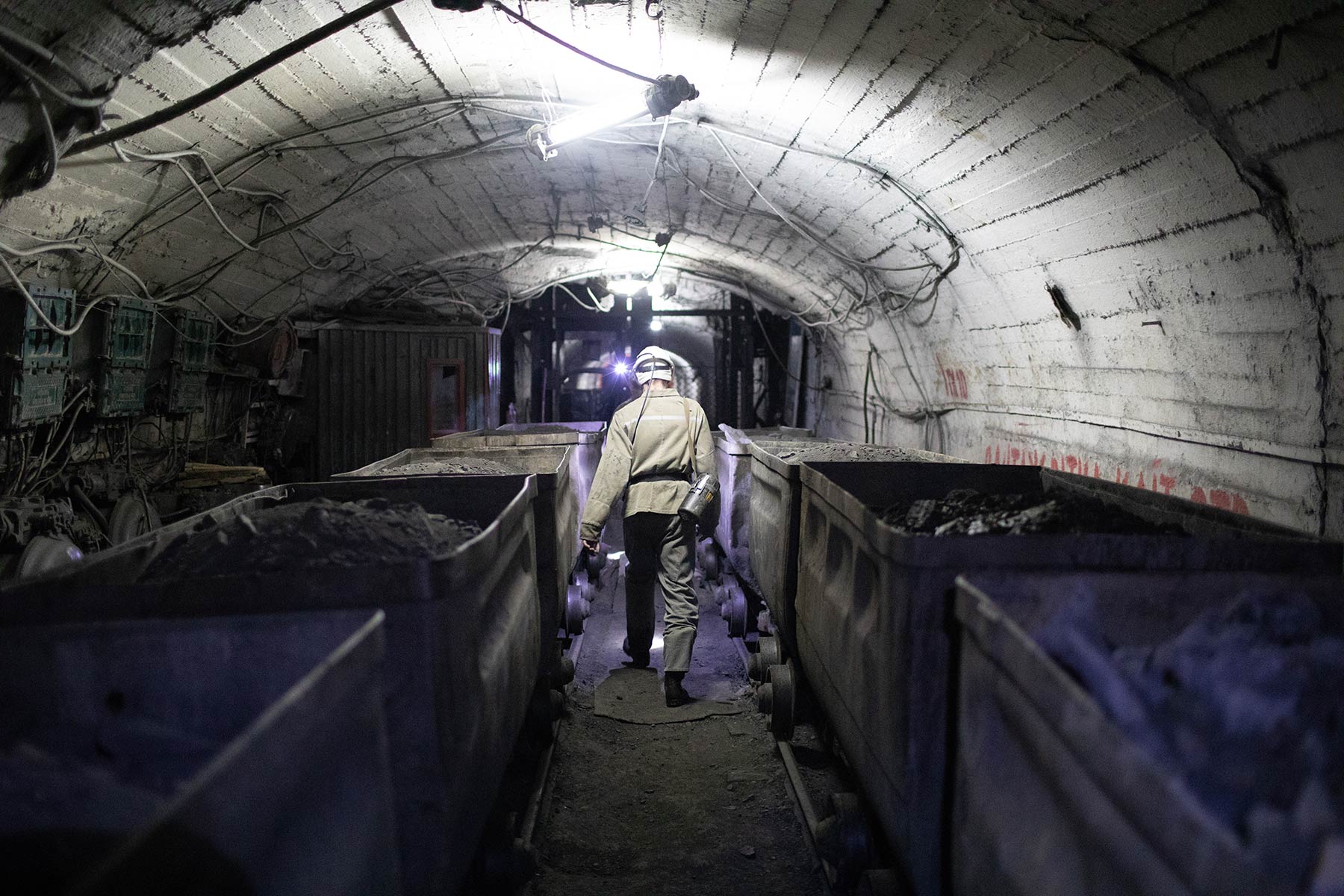At the end of 2023, Ecoaction launched a contest for projects from NGOs aimed at transforming coal communities. Over the course of two rounds of the contest, we supported six projects in different regions of Ukraine. These organisations helped coal-dependent communities, which are at risk of being affected by the phase-out of the coal industry, to mitigate possible impacts and plan their future without coal. Below, we share more about the projects implemented.
What’s the best way to install solar power plants on public buildings? — Modeling by RePower Ukraine for Ladyzhyn and Slobozhanske communities.
The charitable foundation RePower Ukraine implemented two projects within the grant competition. In Ladyzhyn (Vinnytsia region), specialists assessed the solar potential of 20 municipal rooftops using solar mapping technology. They created maps of solar activity and shading for local lyceums, schools, hospitals, and other facilities.
Thanks to the modeling, they were able to calculate the optimal number, capacity, and configuration (placement, tilt angle, etc.) of solar power plants (SPPs) that could be installed on these rooftops to meet the energy needs of the buildings. These calculations will help the city plan the development of solar energy and develop the documentation necessary for the installation of SPPs.

Since the Ladyzhyn coal-fired power plant was damaged by russians, the city now faces new challenges due to its loss. However, according to Acting Mayor Oleksandr Kolomiiets, moving away from coal generation is crucial for the city. The recommendations provided under the project will help Ladyzhyn spend funds more effectively on renewable energy development to replace the harmful and unsafe coal industry.
A similar project by RePower Ukraine was implemented in the Slobozhanske community (Kharkiv region). Here, specialists assessed the solar potential of 15 rooftops and a land plot belonging to the municipal enterprise “Donets”. Both communities are dependent on coal-fired power plants that were damaged by russian attacks, creating an urgent need for alternative sources of energy. Such projects help communities see the potential of solar energy to meet their needs and contribute to the energy transition, even during wartime.
Research on the demand for mining specialists by the Center for International Cooperation and Project Implementation (CICPI)
The CICPI’s project began with a review of educational institutions offering higher and vocational education in mining. Most of those educational institutions were located in the Dnipropetrovsk region: 3 universities and 7 vocational schools. The next step of the project involved conducting surveys in coal communities of this region to identify their real needs in terms of workforce, career guidance, or retraining.
Almost two-thirds of respondents believe their community needs transformation through the reorganisation or closure of mines. Half mentioned a need for retraining programs. However, none reported that such programs currently exist in their communities.
Based on the findings, experts issued recommendations for local authorities, the State Employment Service, and relevant Ministries regarding the creation of career guidance and retraining programs as part of a just transition for coal communities.
Air quality monitoring by Dobropillia Youth Center “Dobro”
During the full-scale invasion, the only source of air quality data in Dobropillia (Donetsk region) was from monitoring stations installed by local activists and volunteers of the NGO “Dobro”. With Ecoaction’s support, they upgraded 5 existing stations and installed another one near a school and a playground to provide residents with more accurate data on the air they breathe.
Moreover, the data collected served as the basis for a comprehensive study on the air quality and the ways to improve it by Dr. Maksym Soroka, Candidate of Technical Sciences. His analysis showed that since the start of the full-scale invasion, local air quality has improved due to the shutdown, relocation, or destruction of industrial enterprises.
However, during winter, critical levels of pollution remain, especially from fine particulate matter, carbon monoxide, and sometimes nitrogen dioxide. The main reasons for the occurring pollution are domestic and municipal heating systems. Based on these findings, the expert developed recommendations for modernising the local heating system to improve air quality. Dobro shared the results through social media, interviews, and publications, making the project transparent and beneficial for the entire community.
Legal framework analysis by the Center for Anti-Crisis Research
With Ecoaction’s support, the Center for Anti-Crisis Research conducted an in-depth analysis of the potential of coal communities and the steps required for their transformation amid the full-scale war, with a focus on green post-war recovery. Additionally, researchers identified legislative gaps that need to be closed to ensure a faster and more effective transition.
The analysis highlighted the need for several new national-level documents, as well as the need to create a Just Transition Fund and generally expand financing opportunities and mechanisms. For better planning of the future transition, experts also recommended expanding the range of stakeholders involved — including local entrepreneurs and independent experts.
Comprehensive recovery program for Petropavlivka community by the “Regional Center for Economic Research and Business Support” Foundation
The Petropavlivka community in Dnipropetrovsk region has suffered from russian shelling and infrastructure destruction since the start of the full-scale invasion. As part of its project, the Foundation helped develop a Comprehensive Recovery Program that outlines clear steps for restoring engineering infrastructure, as well as creating conditions for education, culture, sports, healthcare, safety, and social protection up until 2030.
The program was developed with input from local residents and businesses. More than 200 people shared proposals through surveys and meetings. As a result, 86 development projects were planned, 18 of which were included in the so-called “Green Map” — a list of priority initiatives recommended by residents, business leaders, experts, and local and national authorities.
In September 2024, the Petropavlivka Town Council adopted the Program thus allowing the community to proceed with the plans made.
All six projects were implemented as part of the “New Energy – Fostering Dialogue for Sustainable Development of Ukrainian Coal Regions” project, carried out by partner organisations Germanwatch, Center for Environmental Initiatives “Ecoaction” and Luhansk Regional Human Rights Center “Alternatyva”, with the support of the Federal Ministry for Economic Affairs and Climate Action of Germany in cooperation with Deutsche Gesellschaft für Internationale Zusammenarbeit (GIZ) GmbH.
Want to support our work? You can help Ecoaction’s mission by making a donation.
Translated from Ukrainian by Ecoaction volunteer Elizabeth Kostiana.

